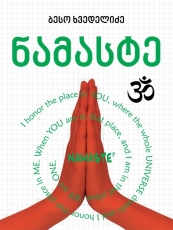NAMASTE
EXTRACT
Translated into English by Maya Kiasashvili
‘There’s no one who’s been to Nepal only once.’
A hippy saying
The visas for Nepal are issued in the Kathmandu airport. A fortnight visa costs 25 dollars, a month one is 40 and a three-month visa costs 100 dollars.
Alexi and I opt for the third one.
‘If we want a real breather from our home, let it be the third option,’ Alexi says.
‘Hey, stupid, you’re filling in the declaration in Georgian,’ I say.
The airport building smells exactly like the Soviet post-offices and is permeated with the 1960s atmosphere. Before you queue for a visa, you have to take a photo in the photo booth, or else you need to have brought a biometric one with you. We had them done in Tbilisi, so we didn’t need to get into the booth and freeze in front of the camera. Next, you have to fill in the declaration full of usual questions. They ask who you are, when you were born, where you are from, the reason of your arrival and others: What are you going to do? How long do you intend to stay? What do youdo? How many times have you been here? After filling all these spaces, we join the queue, patiently waiting for our passports to be stamped. Instead, a strange-looking stamp is stuck to one of the pages. We are finished in half an hour. It is dusk outside. As we leave the airport building, a young man with blindingly white teeth ties yellow silk kerchiefs around our necks and leads us to his jalopy.
It takes only about twenty minutes to get the centre of Kathmandu. The suburbs present a depressing sight at this time of the day: heaps of stinking rubbish, an extremely unpleasant, specific smell, a multi-colored human eddy, bonfires here and there, dust in the air, soot-covered buildings and rows among rows of dirty shanties, bendy and about to collapse. It’s deafeningly noisy – constant tooting, shouts, roar of engines and generators. The feeling is that we were tossed back into Georgia of the 1990s and made to drive along the Zestaponi-Kutaisi suburbs of those blackout days. Our first disheartening impressions start at that point... (See PDF)
In case of using the information, please, indicate the source.
